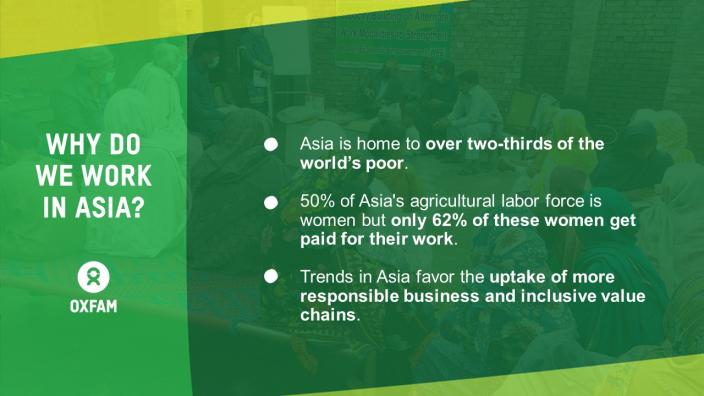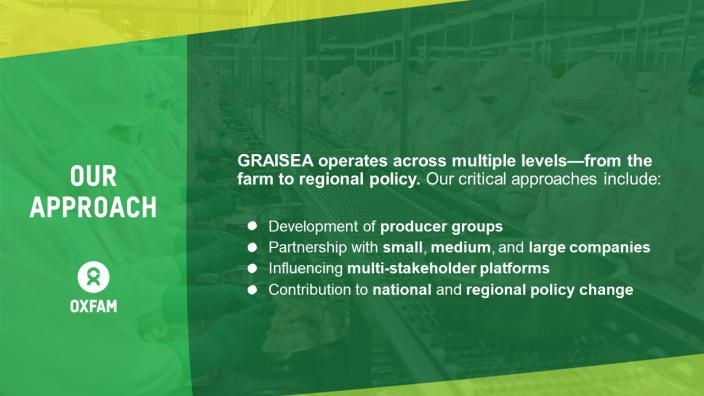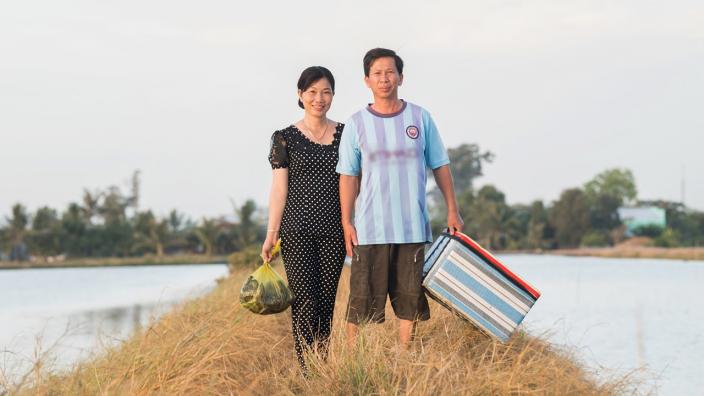Project at a glance
GRAISEA aims to improve the livelihoods of small-scale producers in the agriculture sector in Asia through inclusive value chains and responsible business practices.
Overview
Working in Cambodia, Indonesia, Pakistan, the Philippines, and Vietnam—and with complementing regional influencing work at the ASEAN—GRAISEA uses a variety of partner models at multiple levels to tackle the root causes of poverty, as well as support system-wide change. In GRAISEA, we support the development of agricultural value chains that provide opportunities for women’s economic empowerment, integrate human rights, and promote improved resilience to climate change.
To achieve these aims, we work with farmers, producer groups, local companies, national governments, multi-national corporations, and with the regional economic block ASEAN. We support the capacity development of producer organizations, promote women’s leadership and changes to social norms, bring about direct change to the practice of companies, and promote national and regional policy change.
Our work is funded by the Embassy of Sweden in Bangkok and private sector companies involved in the relevant value chains.

Our commitment
GRAISEA aims to improve the realization of the rights, resilience, and influence of women and men smallholder farmers in the shrimp and rice value chains, and decrease poverty and inequality. We want to achieve this by not just supporting farmers directly but re-shaping the market system, so that change is owned by market actors and achieved at a large scale.
GRAISEA is responding to a key moment in time. While growth in Asia is exacerbating inequality and climate vulnerability, there are trends that favor the uptake of more responsible business and inclusive value chains. The programme leverages these critical junctures so that more responsible practices will be influential for decades to come, as the regional economy continues to develop and ASEAN integration progresses.

Featured publications
Women's human rights and business: What ASEAN governments and businesses can do to support gender equality and the empowerment of women in the workplace https://www.business-humanrights.org/en/from-us/briefings/womens-human-rights-business-what-asean-governments-and-businesses-can-do-to-support-gender-equality-and-the-empowerment-of-women-in-the-workplace/
An assessment of overall effectiveness of agricultural multi-stakeholder initiatives with specific attention to smallholder inclusiveness, and recommendations for improvement https://policy-practice.oxfam.org/resources/an-assessment-of-overall-effectiveness-of-agricultural-multi-stakeholder-initia-621185/
ASEAN through a gender lens: Recommendations for the Full Implementation of the Action Agenda on Mainstreaming Women’s Economic Empowerment in ASEAN https://philwen.org/wp-content/uploads/2021/04/ASEAN-Through-A-Gender-Lens-PhilWEN-OXFAM-Briefing-Paper.pdf
Recent stories
Resilience in the face of COVID-19: The collective action of rice farmers in Pakistan /latest/stories/resilience-face-covid-19-collective-action-rice-farmers-pakistan
How Vietnamese smallholders overcame a twofold crisis /latest/stories/how-vietnamese-smallholders-overcame-twofold-crisis
Responsible investment key to better post-COVID-19 agriculture in ASEAN /latest/blogs/responsible-investment-key-better-post-covid-19-agriculture-asean
Women at work deserve better from governments and businesses /latest/blogs/women-work-deserve-better-governments-and-businesses
Women farm, too: Unearthing women’s voices in agriculture /latest/blogs/women-farm-too-unearthing-women%E2%80%99s-voices-agriculture
Subscribe to our newsletter
Do you want to see clear examples of how change is happening in the rice and shrimp value chains in Asia? Read our quarterly newsletters here. To subscribe, send an email to MAranas@oxfam.org.uk.
Stay connected
Ashley Aarons, GRAISEA Team Lead: Aarons@oxfam.org.uk
